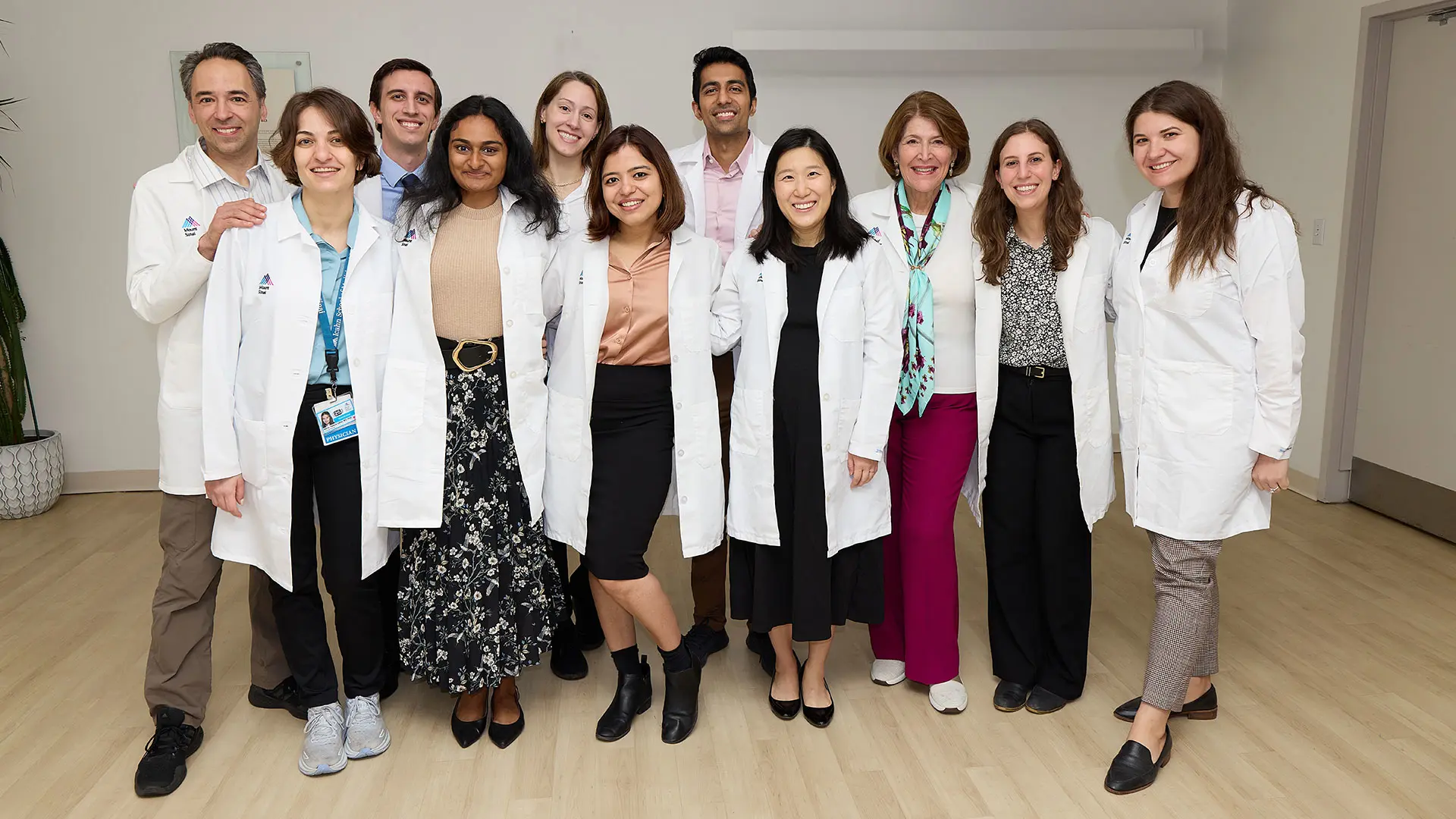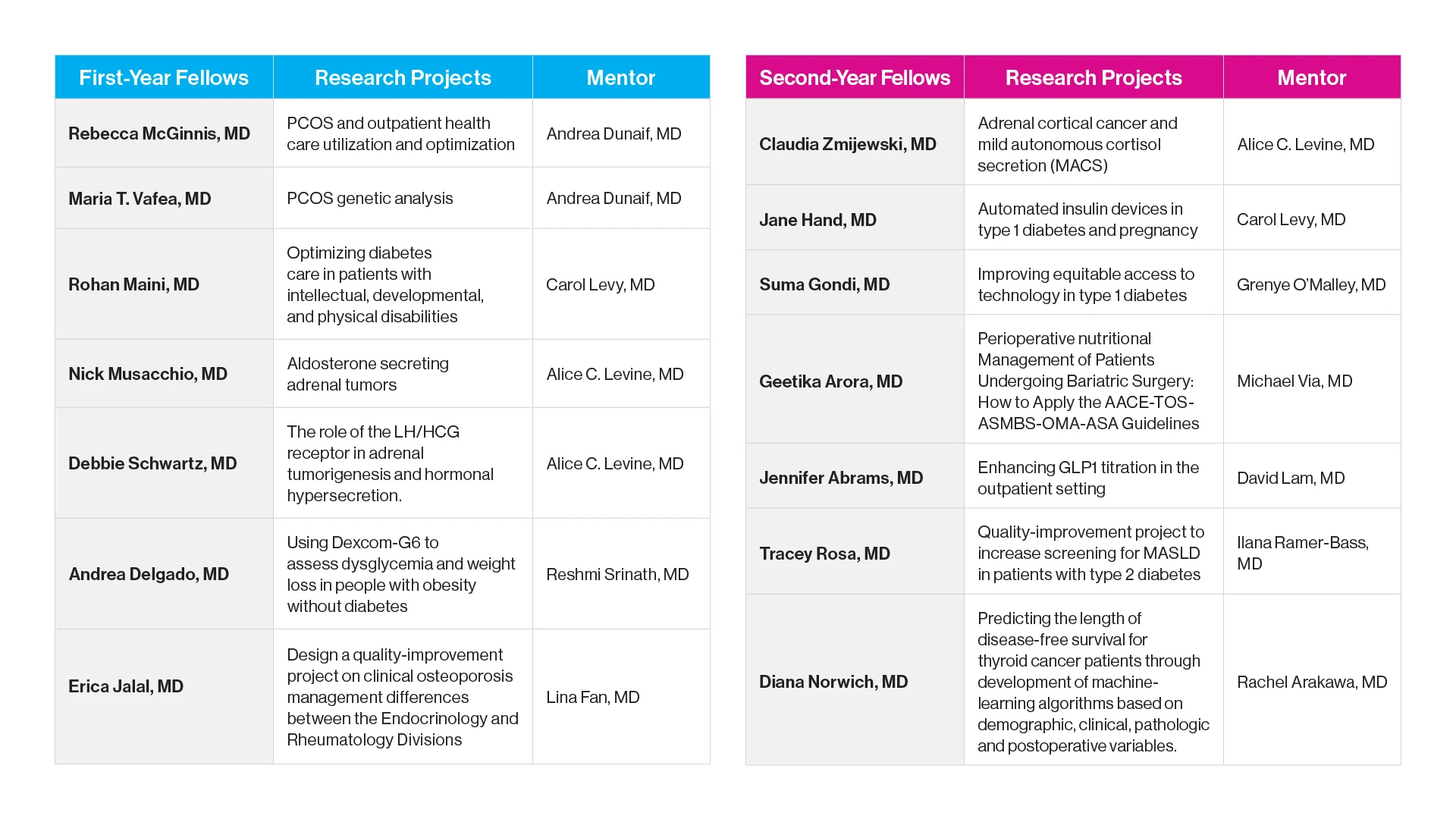The merger of Mount Sinai’s Endocrinology fellowships into a systemwide, five-hospital program has created the largest such program in the United States, with the 14 fellows gaining a wide variety of experience in research and clinical care. In the Endocrinology, Diabetes and Bone Disease Fellowship, fellows are treating complex conditions in the large population that the Mount Sinai Health System serves, and working closely with renowned experts in the field. By 2025, many of the fellows joined the faculty of the Icahn School of Medicine at Mount Sinai.
Previously, there were two separate endocrinology fellowships, one housed at Mount Sinai Beth Israel, Mount Sinai Morningside, and Mount Sinai West, and one at The Mount Sinai Hospital and the James J. Peters Veterans Affairs Hospital in the Bronx. Now, there is one broad program with seven fellows per class, who rotate through all five campuses.
“We have the largest program by far in the country since we merged. It has been extremely successful. There is a definite buzz about our fellowship program,” says Alice C. Levine, MD, Director of the fellowship and Professor of Medicine (Endocrinology, Diabetes and Bone Disease), Icahn School of Medicine at Mount Sinai. “Fellows get exposed to many different sites, attendings, and patient populations. It has been a very exciting endeavor.”
Five of the first fellows in the expanded program are now Assistant Professors of Medicine (Endocrinology, Diabetes and Bone Disease) at the Icahn School of Medicine at Mount Sinai: Rachel Sheskier, MD, Jiby Yohannan, MD, Leah Kaplan, MD, Daniel Slack, MD, and former chief fellow Alon Mazori, MD. Four of the fellows graduating in June 2025 are also set to join Mount Sinai.

From left: Michael Via, MD; Maria Tsikala Vafea, MD; Nicholas Musacchio, MD; Suma Gondi, MD; Rebecca McGinnis, MD; Geetika Arora, MD; Rohan Maini, MD; Jane Hand, MD; Alice Levine, MD; Jennifer Abrams, DO; and Claudia Zmijewski, MD.
The expanded program allows fellows to choose either a two-year master clinician or three-year physician-scientist track. During the first year, all fellows explore the breadth of endocrinology with hospital rotations encompassing diabetes, adrenal/pituitary, thyroid, bone and mineral, reproductive endocrinology, high-risk obstetrics, obesity medicine, and transgender medicine, learning from world-renowned mentors in each area.
Second-year master clinician fellows divide their time between outpatient clinical work in subspecialty endocrine clinics and scholarly projects in a focused area under the direction of faculty mentors who are, themselves, master clinicians. The physician-scientist fellows spend 75 percent of their second and third years on mentored research, with dedicated funding, and with a view toward developing careers as physician-scientists.
The fellowship program takes advantage of all the strengths of the Mount Sinai Health System, says Co-Director Michael A. Via, MD, Associate Professor of Medicine (Endocrinology, Diabetes and Bone Disease), and Medical Education. “Dr. Levine and I took a lot of feedback from fellows themselves and how they thought things might go,” he says. “With that, we put together a schedule and a curriculum and a series of rotations. The system we have in place provides world-leading fellowship training in endocrinology.”
The fellows have the opportunity to work closely with mentors who are world leaders in their fields, including Andrea Dunaif, MD, Chief of the Division of Endocrinology, Diabetes and Bone Disease, and the Lillian and Henry M. Stratton Professor of Molecular Medicine. Jane Hand, MD, a chief fellow, is working on automated insulin delivery devices in pregnancy with mentor Carol J. Levy, MD, Clinical Director of the Mount Sinai Diabetes Center, and Professor of Medicine (Endocrinology, Diabetes and Bone Disease). The other chief fellow, Claudia Zmijewski, MD, is working on adrenal cortical cancer and mild autonomous cortisol secretion with Dr. Levine.
Other fellows are immersed in a wide range of subjects:

"It is an absolute honor to work with Dr. Alice Levine, a true world expert of the adrenal gland, as my mentor,” Dr. Zmijewski says. “Under her guidance, I am learning about the complexities and nuances involved in the diagnosis and management of challenging adrenal diseases. As the adrenal fellow, I've also had the privilege of submitting a rare case of adrenocortical carcinoma to a peer-reviewed journal, presenting at the 2024 Adrenal Preceptorship program sponsored by the Endocrine Fellows Foundation, and leading the Adrenal Conference, a multidisciplinary monthly discussion of interesting adrenal cases and relevant clinical questions."
Among the current fellows, 13 opted to join the two-year master clinician track, and one has enrolled in the three-year physician scientist track. A strength of the program is that it offers this variety of options, Dr. Via says. "It is a rare person who dedicates themselves to a career in scientific investigation and research, as opposed to the master clinician track, where most of the time is spent in the care of patients,” Dr. Via says. "At Mount Sinai, we are proud to train fellows for both of these paths. Our graduates go on to become future leaders in academic medicine."
Dr. Hand says that choosing Mount Sinai for her endocrinology fellowship was the best decision she could have made. “Thanks to the robust training of our program, I feel well-prepared for the next step in my career,” Dr. Hand says, “and I am excited to join the faculty this summer."
Learn more about the Endocrinology, Diabetes and Bone Disease Fellowship at Mount Sinai.
Read about the Division of Endocrinology, Diabetes and Bone Disease in the 2025 Specialty Report.
